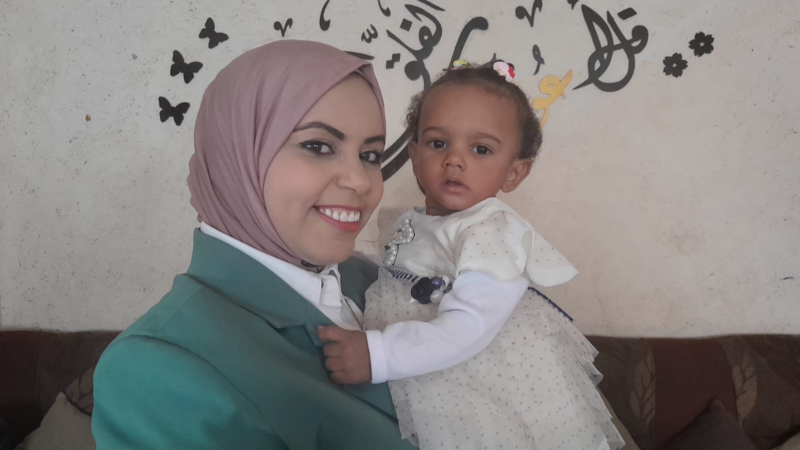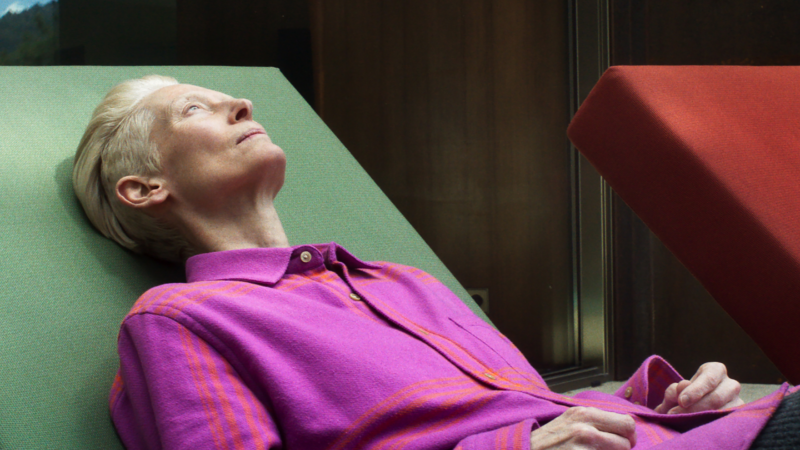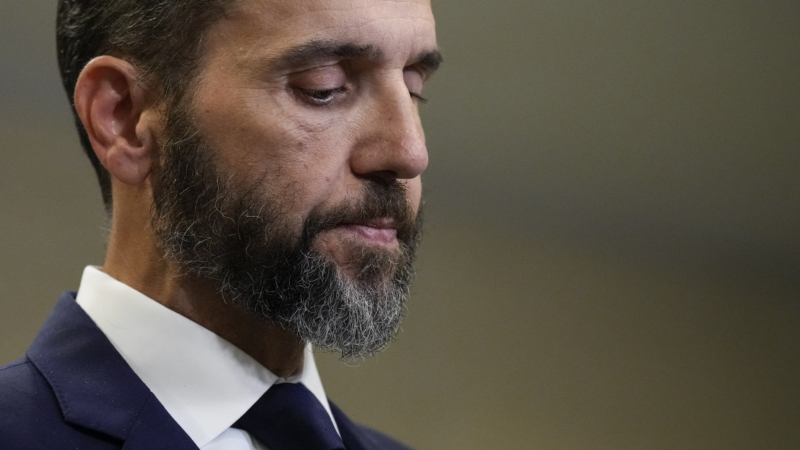An unknown infant was rushed to a Gaza hospital. A nurse gave her a name, and a home
In late October 2023, Israeli strikes killed dozens of Palestinians in the Sabra neighborhood of Gaza City. Among those wounded was a newborn baby girl — whom rescuers found in a tree.
Paramedics rushed the infant to Shifa Hospital in Gaza City, the Gaza Strip’s biggest hospital at the time, and handed her over to Dr. Nasser Bolbol, who placed her in an incubator.
“I was told she was the only survivor of a massacre,” says Bolbol, the head of the hospital’s premature babies department. The stump of the baby girl’s umbilical cord was still soft. There were traces of milk reflux on her, a sign that she’d been breastfed during or immediately before the attack.
Bolbol recorded her arrival in the hospital’s newborns registry, along with the date and location where she was found.
But nobody knew if her family had survived — and no one knew the baby’s name.
“I myself wrote the word ‘unknown’ on her file,” Bolbol says.
A nurse gives her a name
Thousands of Palestinian children are believed to have been orphaned in Israel’s ongoing offensive in Gaza.
To date, more than 44,000 Palestinians have been killed and more than 100,000 injured by Israeli forces, according to Gaza health officials. Humanitarian groups estimate thousands of young children and infants are among the dead. The war was sparked on Oct. 7, 2023, when Hamas launched one of the deadliest attacks on Israel in recent history, killing nearly 1,200 people, according to Israeli officials.
Later that same month, when the infant girl was brought to Shifa, hopes were high that the war would end quickly and the newborn’s parents or relatives would show up looking for her.
Instead, Israeli soldiers, pursuing Hamas operatives, invaded the hospital in November, and the baby’s records were lost after intense shooting and fighting took place inside the facility.
“Her file is gone,” Bolbol says.

The baby and 30 other premature infants were evacuated in a high-stakes international operation to the Al-Helal Al-Emirati Hospital in the southern Gaza city of Rafah.
The babies were transferred with only a list of their mothers’ names — something the unknown newborn girl did not have.
In the neonatal intensive care unit, she shared the same incubator with others, as the war continued and more infants were brought to Rafah from Gaza hospitals. Doctors opened a new file for her, indicating she was an “unknown baby — unidentified.”
“Her file only read, ‘a survivor from a massacre in Al-Sabra neighborhood,'” recalls Amal Abu Khatleh, a 33-year-old nurse who was working in the Emirati hospital when the babies were brought in.
Abu Khatleh couldn’t tolerate the term “unknown” for a baby girl. So she decided to give her a real name: Malak. In Arabic, it means angel.
“I have fallen in love with her,” Abu Khatleh says.
The nurse became the baby’s foster mother
Baby Malak shared the same incubator with other infants for two months, but Abu Khatleh worried that she would be exposed to infections and could suffer developmental problems if she were left in the hospital without enough human contact.
“Her day was all about staring at the roof of the room,” the nurse says.
So Abu Khatleh, who is single with no children of her own, asked the hospital to allow her to take Malak home with her. After weeks of discussions, the hospital agreed — on the condition that she bring Malak back when the war is over.

Abu Khatleh brought Malak home and took care of her in Rafah until May, when Israeli soldiers invaded the city. Abu Khatleh and the baby, then about 6 months old, fled along with much of the rest of Rafah’s population. Amid shooting, Abu Khatleh carried Malak on foot until they reached the nearest city, Khan Younis, about seven miles away.
“I was extremely afraid with every single step,” Abu Khatleh recalls. “I was carrying Malak all the way. I took her toys, clothes, diapers and milk. I had to choose between my things and hers. I took hers.”
After they reached Khan Younis, she and the baby went by taxi to Deir al-Balah in central Gaza, where the two have been sheltering since.
A search for surviving family
Abu Khatleh opened an Instagram account, posting videos of Malak and desperately searching for any living relatives. All the comments she has received are of support and blessings, but no leads.
There are no surviving records of new births from the first days of the war, says Zaher Al Wahaidi, head of the Gaza Health Ministry data entry department.

There is also little chance that Malak’s parents had registered her birth during intense Israeli airstrikes in northern Gaza at the beginning of the war, Al Wahaidi says.
“I will keep her if I never manage to find her real parents,” Abu Khatleh says.
A mother-child relationship
In addition to a name, Abu Khatleh decided to give Malak a date of birth. Given her experience with premature babies and their development, she says Malak was likely born around Oct. 23, 2023. And, she says, the double 23 sounded special enough.
Her love for Malak has only grown over time. The baby stays with her sister while Abu Khatleh works during the day.

“When I am back from work, that is party time for her,” the nurse says of Malak. “She gives me a hug and many kisses. She even looks like me now.”
And Malak recently celebrated her first birthday in the two-bedroom apartment in central Gaza where she lives now with Abu Khatleh, Abu Khatleh’s sister and nine other children. She wore a white, frilly dress. There was a cake, popcorn and sweets.
“When I am with her,” Abu Khatleh says, “I forget about the war.”
Transcript:
AYESHA RASCOE, HOST:
Thousands of children are believed to have been orphaned in Israel’s ongoing offensive in Gaza, some of them too young to know who they are and who they’ve lost. NPR producer Abu Bakr Bashir brings us this report about a baby girl who was discovered alone and the new home she’s been given.
(SOUNDBITE OF BABY COOING)
ABU BAKR BASHIR, BYLINE: This baby girl was found in a tree. That is what Dr. Nasser Bolbol was told. He directs the premature babies department at Shifa Hospital in Gaza City.
NASSER BOLBOL: (Through interpreter) She was handed to me in person. I was told she was the only survivor of a massacre.
BASHIR: He was told paramedics found her in the Sabra neighborhood of Gaza City after Israeli strikes killed dozens of Palestinians there. The baby was only days old. Dr. Bolbol says the stump of her umbilical cord was still soft. He put her in an incubator and registered her in the hospital’s newborns registry.
BOLBOL: (Through interpreter) I myself wrote the word unknown on her file.
BASHIR: Unknown – nobody knew if her family survived, and no one knew her name. This all happened at some point a few weeks into the war, but the doctor was not sure of the exact date because Israeli soldiers invaded his hospital a few weeks later. The military says it was pursuing Hamas operatives. Her records were lost.
BOLBOL: (Through interpreter) Her file is gone. It’s gone.
BASHIR: This baby and 30 other premature infants were in the hospital when Israeli soldiers raided it. The babies were evacuated in an international operation and brought to the Emirati Helal Hospital (ph) in southern Gaza with only a list of their mothers’ names, something the unknown baby girl did not have.
AMAL ABU KHATLEH: (Through interpreter) Her file only read, a survivor from a massacre in Al-Sabra neighborhood.
BASHIR: This is Amal Abu Khatleh, a 33-year-old nurse who was working in the hospital when the babies were brought there. Abu Khatleh said she couldn’t tolerate the term unknown for a baby girl. She gave her a real name, Malak. In Arabic, it means angel.
ABU KHATLEH: (Through interpreter) I have fallen in love with her. I have no explanation or a specific reason for that.
BASHIR: After two months of Malak sharing the same incubator with other babies, the nurse was worried she would be exposed to infections. She asked the hospital to allow her to take Malak home with her. After weeks of discussions, the hospital agreed on the condition that she bring her back when the war is over.
(SOUNDBITE OF BABY COOING)
ABU KHATLEH: Da-da.
BASHIR: Abu Khatleh is single, with no children of her own. She and little Malak have developed a kind of mother-baby relationship.
ABU KHATLEH: (Through interpreter) I spend all my time with Malak, feeding her and playing together. When I’m at work, she stays with my sister, but I keep calling on her all the time. When I’m back, that is a party time for her. She gives me a hug and many kisses. She even looks like me now.
BASHIR: The nurse decided to give Malak a date of birth. She picked October 23, 2023. She says that, given her experience with premature babies and their development, Malak was likely born around that date, and the double 23 sounded special enough.
ABU KHATLEH: (Non-English language spoken).
(SOUNDBITE OF BABY COOING)
BASHIR: The nurse opened an Instagram account, posting videos of the baby and desperately searching for any living relatives. All the comments there are of support and blessings, but no leads. I reached the head of the Gaza Health Ministry’s data entry department, Zaher Al Wahaidi, who is sheltering in a tent. He told me there are no surviving records of new births from the first days of the war and that, anyway, there is little chance baby Malak’s parents had registered her birth during intense Israeli air strikes in northern Gaza at the beginning of the war. In May, Israel launched an incursion into the southern city of Rafah, and the nurse escaped with the baby.
ABU KHATLEH: (Through interpreter) Suddenly, there were tanks and shells. It was very difficult. I was extremely afraid with every single step. I walked around one hour from Rafah to Khan Younis. I was carrying Malak all the way. I took her toys, clothes, diapers and milk. I had to choose between my things and hers. I took hers.
BASHIR: Today, Abu Khatleh and baby Malak are in central Gaza, sharing a two-bedroom apartment with nine other children and two adults, and she’s preparing for the possibility that she may never find Malak’s real parents.
ABU KHATLEH: (Through interpreter) If that happens, I will keep her.
(SOUNDBITE OF BABY CRYING)
BASHIR: As the war goes on, Abu Khatleh keeps posting videos of baby Malak. In one, the baby sleeps in a yellow dress while her foster mother fans her with a plastic dish to keep her cool because there is no air conditioning or electricity. Malak’s diary of growing up, wearing different outfits – it’s all there on Instagram.
ABU KHATLEH: I want to help her have some nice memories that will stay with her when she’s grown up. These memories could help her deal with the shock of the truth she will find out someday.
BASHIR: Baby Malak has given this nurse something in return. She told me, when I am with her, I forget about the war.
For NPR News, I am Abu Bakr Bashir.
(SOUNDBITE OF MUSIC)
A record 24 million people now get Obamacare health plans. Will it last under Trump?
Enrollment in Affordable Care Act health insurance plans has grown every year of the Biden administration, leading to a record high rate of people with insurance.
Tilda Swinton thinks about death and says you should, too
Swinton plays a woman dying of cancer in Pedro Almodóvar's The Room Next Door. "A life spent considering how we're going to spend our end is not wasted time," Swinton says.
Girl Scouts are retiring two cookie flavors (don’t worry, your Thin Mints are safe)
2025 will be the last time you can buy Girl Scout S'mores and Toast-Yay! cookies. They join the ranks of many other discontinued flavors — RIP Mango Cremes with Nutrifusion and cheesy Golden Yangles.
Here’s where things stand for several major landmarks in the Los Angeles fires
The fires raging across Los Angeles are putting some cultural institutions in danger.
Justice Department wants to release only part of its report on Trump cases
Prosecutors dropped the two criminal cases against Trump after he won the 2024 election, and the final report by Smith may be the last chance for prosecutors to explain their decisions.
Trump asks the Supreme Court to block his sentencing in hush money case
President-elect Donald Trump is scheduled to be sentenced on Jan. 10 in New York. His latest legal move to block sentencing comes after a New York appeals court rejected a similar appeal Tuesday.





